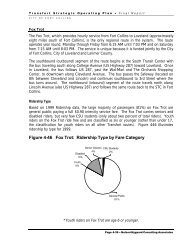TO KILL A MOCKINGBIRD / SYNOPSIS
TO KILL A MOCKINGBIRD / SYNOPSIS
TO KILL A MOCKINGBIRD / SYNOPSIS
Create successful ePaper yourself
Turn your PDF publications into a flip-book with our unique Google optimized e-Paper software.
<strong>TO</strong> <strong>KILL</strong> A <strong>MOCKINGBIRD</strong> / <strong>SYNOPSIS</strong><br />
As one of Harper Lee’s characters comments, “Even<br />
in 1935, Maycomb, Alabama, is already an old<br />
town––a tired old town…. There’s no hurry because<br />
there’s nowhere to go, nothing to buy, and nothing<br />
to buy it with.” But as the audience soon learns, the<br />
town’s sleepy, peaceful appearance hides powerful<br />
undercurrents of fear, racial prejudice, and violence.<br />
Young Scout Finch is disappointed that her father,<br />
Atticus, a widowed attorney, is unlike other fathers,<br />
who “go hunting, play poker, and…fi sh.” As she waits<br />
for him on the front porch, a classmate taunts her,<br />
shouting that Atticus is a disgrace because “he defends<br />
niggers!”<br />
Two neighbors, Miss Maudie and Miss Stephanie,<br />
gossip on their porches, and Scout joins them in<br />
speculating about a reclusive neighbor, Arthur “Boo”<br />
Radley. They suspect that the seldom-seen Mr. Radley<br />
is not only insane but a Peeping Tom. Scout’s older<br />
brother, Jem, enters, tossing a football.<br />
Reverend Sykes, the minister of the town’s black<br />
congregation, stops by to speak to Calpurnia, the<br />
Finch’s housekeeper, about their shared concern for<br />
Tom Robinson and his family. Then Bob Ewell and his<br />
daughter Mayella appear briefl y. Their conversation,<br />
in which Bob Ewell orders Mayella to stay out of town,<br />
reveals his domineering, abusive temperament and<br />
her habit of meek compliance.<br />
Calpurnia explains to Scout that Bob Ewell has accused<br />
Tom of raping Mayella. Tom is presently in jail, which<br />
is a hardship for his family and a cause of great anxiety.<br />
Scout discounts Bob Ewell’s accusation, commenting<br />
that everyone knows the Ewells are contemptible.<br />
Twelve-year-old Charles Baker “Dill” Harris enters<br />
and introduces himself to Scout and Jem. The children<br />
talk about Boo Radley, inventing fantastic tales of his<br />
nocturnal activities, which they think may include<br />
<strong>SYNOPSIS</strong> / Page 1 of 2<br />
www.montanarep.org<br />
eating squirrels and cats. Later Dill suggests that they<br />
try to make Boo come out of his house. The three sneak<br />
into the Radley yard, and Jem winds up to throw a stone<br />
at the house. Just then, Atticus arrives and admonishes<br />
the children not to bother Boo. He tells them they’ll<br />
get along better with all kinds of people if they try to<br />
see things from the other person’s point of view––if<br />
they “climb into his skin and walk around in it.”<br />
Jem is hurt and angry when Atticus declines his invitation<br />
to play catch and refuses to show the children how<br />
to shoot their air rifl es. Like Scout, Jem is disappointed<br />
that Atticus isn’t a typical Maycomb father.<br />
Atticus explains that, in order to follow his conscience,<br />
he will defend Tom Robinson, defying local racist<br />
attitudes. He says he doesn’t expect to win the case<br />
and warns Scout that a diffi cult time lies ahead. He<br />
encourages her to remember in the coming weeks that<br />
Maycomb is still their home and its residents are still<br />
their friends.<br />
Scout and Jem revise their opinion of their father when,<br />
in a riveting scene, Atticus protects his family and the<br />
Maycomb community by killing a rabid dog with one<br />
skillful shot. The children, proud to learn that their<br />
father was a locally famous marksman in his youth,<br />
regard him with new respect.<br />
Tom Robinson is moved to the Maycomb County jail,<br />
and Sheriff Tate fears the interference of a rowdy mob.<br />
That evening, Atticus mysteriously leaves the house,<br />
and the children secretly follow him to the jailhouse,<br />
where they watch, unseen, as a hostile group of men<br />
confronts him. The children, alarmed, emerge from<br />
hiding. Scout reminds one of the men, Mr. Cunningham,<br />
that she goes to school with his son. Ashamed, he<br />
leaves, taking the others with him. Atticus explains to<br />
the children that Mr. Cunningham behaved as he did<br />
because he was part of a mob; he chose to leave because<br />
Scout reminded him that he was still a man.
<strong>SYNOPSIS</strong> / Page 2 of 2<br />
www.montanarep.org<br />
On the day of the trial, the courtroom is packed. The<br />
children, against their father’s wishes, watch from the<br />
balcony. Atticus’ skillful questioning reveals glaring<br />
inconsistencies in the testimony of both Bob and<br />
Mayella Ewell. The young woman’s loneliness is<br />
revealed, as is her fear of her father’s violence. Tom<br />
testifi es that on the day in question, Mayella made<br />
unwelcome sexual advances to him while he was<br />
helping her with her chores. He fl ed just as Bob Ewell<br />
arrived home. After calling the jury’s attention to<br />
Tom’s withered left hand, Atticus asserts that Mayella’s<br />
injuries were infl icted by a left-handed attacker––her<br />
father. Humiliated and furious, Bob Ewell threatens to<br />
kill Atticus.<br />
When the jury returns to the courtroom, the verdict<br />
is announced: guilty. As Atticus leaves, many of the<br />
spectators stand to show their respect. Miss Maudie<br />
tells the children that many others in town agree with<br />
Atticus, and although the verdict was wrong, the trial<br />
represents a small step toward change.<br />
Tom is sent to prison pending appeal, but “fed up with<br />
white men’s chances,” he desperately tries to escape<br />
and is shot. The Maycomb community is shocked to<br />
learn of his death. Bob Ewell, however, is gleeful about<br />
the terrible news and repeats his death threat against<br />
Atticus.<br />
Some weeks later, on a chilly fall night, Jem and Scout<br />
are attacked on their way home from a school pageant.<br />
In response to their cries, a big man runs to their<br />
assistance from the Radley house. He overcomes the<br />
children’s attacker and carries an injured Jem home,<br />
accompanied by Scout, who is unhurt. After a doctor<br />
sets Jem’s broken arm, the big man, who turns out to<br />
be Boo Radley, sits with Scout beside the boy’s bedside.<br />
Sheriff Tate arrives, reporting that he found Bob Ewell<br />
dead, stabbed with a kitchen knife, but his offi cial<br />
report will list the cause of death as suicide.<br />
Scout tells Atticus that telling the truth about Bob<br />
Ewell’s death––thus dragging the reclusive Boo into<br />
the limelight––would be “like shooting a mockingbird.”<br />
All the rumors about him were wrong, she says; in fact,<br />
Boo turned out to be “real nice.” Atticus replies, “Most<br />
people are, Scout––when you fi nally see them.”


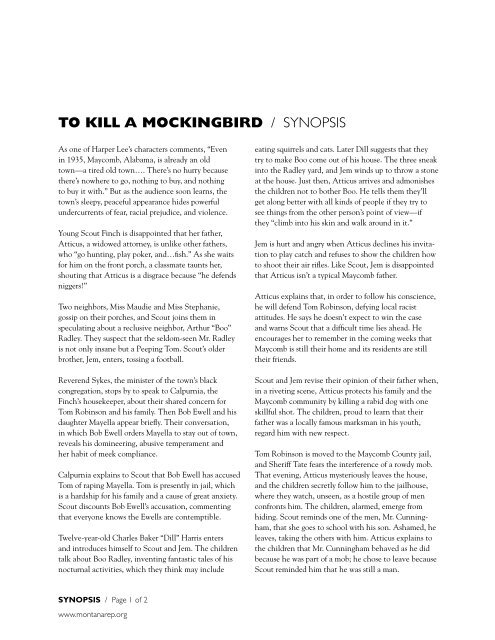

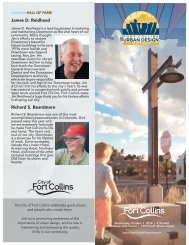

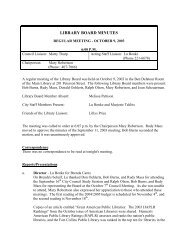
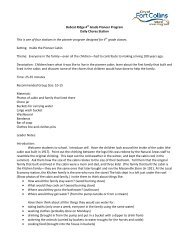
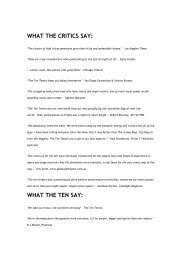
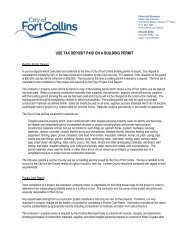
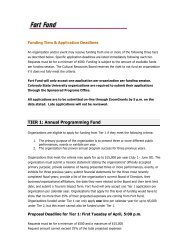



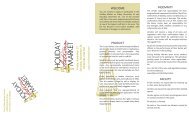
![Fort Collins Tree ID Study Guide [Compatibility Mode]](https://img.yumpu.com/20764911/1/190x135/fort-collins-tree-id-study-guide-compatibility-mode.jpg?quality=85)
